
How many times has it happened to you that you have felt uncomfortable in a situation where communication becomes tense or is broken by a gesture from the person with whom you are having a conversation?
In relationships, most problems and misunderstandings come from a lack of emotional management skills and communication tools, as well as the use of gestures that create tension at the moment; We are going to see how these gestures damage the relationship little by little and how to realize what is happening to change that pattern
Non-verbal communication and its impact on relationships
The relationship can diminish because the people involved do not know how to express themselves or assume that the other person knows what is inside their head, and if we add to this body or facial gestures that demonstrate our dislikes it becomes more difficult to understand each other.
People grow and mature with life experiences, but we lack education on an emotional level and we do not know other ways of reacting or gesturing than those learned in childhood and adolescence from our family and social environment, which is why some remain childish in their bodily reactions when speaking. It is as if when we speak we continue to use the same words that we used when we were children.
The gestures
The gestures refer to the movements we make with our face and body, with which we react to a situation or comment. There are gestures that usually harm communication and people do not realize that they are doing them, such as when we rotate our eyes, turning them up as a sign of annoyance, or when we purse our lips, tightening them and moving our jaw forward as a sign of no. acceptance or non-recognition of something they tell us; also grumble as a sign of resistance. Another gesture is to voluntarily close our eyes slowly while clenching our back teeth as a sign of displeasure. Or touching oneself on the forehead with an open hand by joining the fingers as a way of communicating something that makes us impatient or a way of signaling that the other person is not thinking, perhaps insinuating that they are stupid; It is usually accompanied by a snort or sigh, also when standing with arms crossed in anger.
The sounds
Non-verbal communication also includes noises or sounds that we can capture in onomatopoeias, such as when we breathe deeply and blow air with force and our lips a little together, creating a sound as a way of communicating that we are upset trying digest a complicated emotion Or when we snort as a sign of boredom, apathy or indolence, or that we do not agree, those that are written as pfff or jumm.
The need to learn to communicate well
As we can see, this form of language represents thick emotions that need to be expressed and We do not know how to understand or manage them to be communicated with verbal language ; These forms of bodily communication clearly indicate our internal emotional state, they are learned in childhood and we never re-evaluate them. We are not talking about that we should repress emotions to control the bodily reaction that communicates that emotion in a gestural way. It’s important to validate the way we feel, but we must observe our reactions and behaviors at the body level If they are like those described above, since they are reactions coming from the way we interpret what is happening to us, which is still childish, since we have not done the work of consciousness to understand if we are acting in this way and make a change. in the pattern.
By observing ourselves objectively we will be able to recognize what level of self-knowledge and emotional maturity we are at, and thus grow. It takes humility and courage to accept when we are being childish in the way we are reacting, because It leads us to question whether we are adequately interpreting what they communicate to us
How to achieve it?
The exercise consists of be attentive to our body and how he behaves in those certain moments, attentive to those emotions that are passing through within; feel them trying to describe them with words, how are the emotions feeling in the body?
Another way to become aware of ourselves and whether we are being a victim of these automatic gestures is to close your eyes and enter the memory of that conversation we had that did not end well, and without blaming anyone (we just want to know if we have incorporated these gestures), observe our person as if they were someone else, (imagine that you are someone who does not know you). Looking at you, observing you carefully. How do you move? How do you react? How do you say things, what tone do you use? And the key question: Am I using these gestures? Is it necessary to add tension to the moment with these attitudes? Don’t judge or reproach yourself, just be aware and pay attention to yourself.
No problem, nobly accept if you are using automatic gestures which do not help to have good communication, because from here, having a vision of yourself, you understand what you have to avoid to never again be a victim of your pattern when reacting.
In order to have management and control over these forms of communication, it is necessary to go through this observation process; We must take this training as a research process, also observing other people in similar circumstances and assessing how they act and react, assessing to what extent the participants make themselves uncomfortable, how it affects the other’s mood, what they contribute to them and thinking. What would be a more appropriate way to gesture the body?
Imagine that whenever you have to have an important conversation with your partner, he or she reacts with gestures, attitudes and behaviors of this type; There will come a time when you even avoid communication because it becomes tense and uncomfortable, and you get tired, solely because the other person is having childish body language that is easy to mature.
It is about being aware of our body and how it feels emotions, understanding what are those signals that we send with our gestures to the other person and that changes the context of communication, which does not help it to flow in a natural way. without creating an environment with bad energy.
It also helps to apply body relaxation techniques, before uncomfortable conversations, do deep breathing, tension exercises and muscle distension. In this way we make the body more flexible and unload a little. Let’s remember that emotions are felt in the body, we must involve it in managing them.








